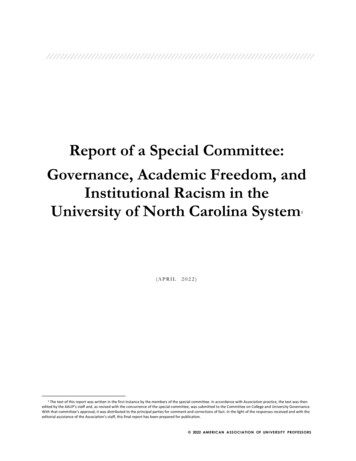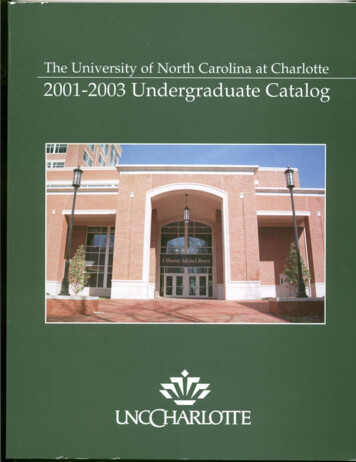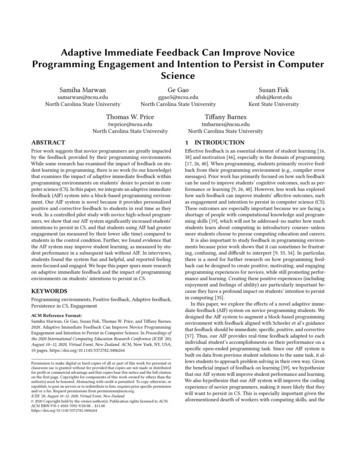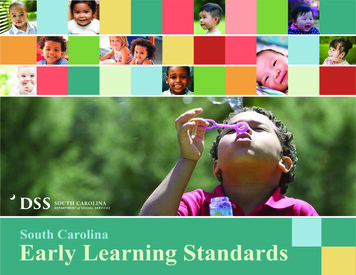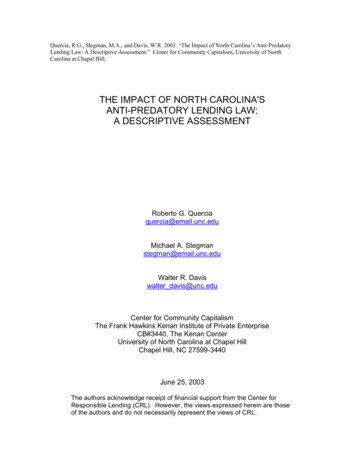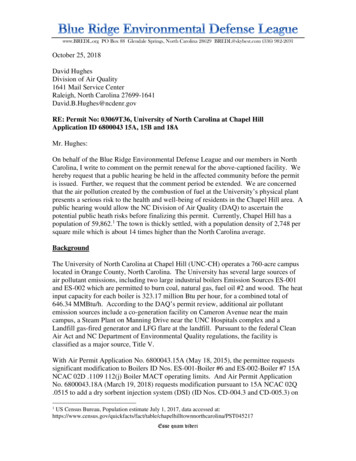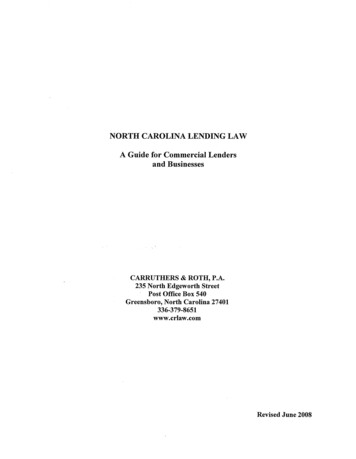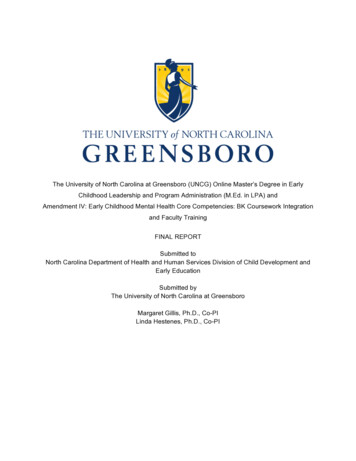
Transcription
The University of North Carolina at Greensboro (UNCG) Online Master’s Degree in EarlyChildhood Leadership and Program Administration (M.Ed. in LPA) andAmendment IV: Early Childhood Mental Health Core Competencies: BK Coursework Integrationand Faculty TrainingFINAL REPORTSubmitted toNorth Carolina Department of Health and Human Services Division of Child Development andEarly EducationSubmitted byThe University of North Carolina at GreensboroMargaret Gillis, Ph.D., Co-PILinda Hestenes, Ph.D., Co-PI
NC DCDEE Race to the Top - Early Learning ChallengeThe University of North Carolina at Greensboro - Online Master’s Degree in Early ChildhoodLeadership and Program Administration andAmendment IV: Early Childhood Mental Health Core Competencies: BK Coursework Integrationand Faculty TrainingFinal ReportContentsOnline Master’s Degree in Early Childhood Leadership and Program AdministrationIntroduction . 1Program Development. .1Student Cohorts .3Program Implementation .4Projected Output and Goal #1: Course Offerings .6Projected Output and Goal #2: Course Evaluations 6Community Impact: Final Internship Projects 6Final Portfolios 7Student Perspectives: Quotes from Spring 2016 Student Survey .7Lessons Learned . .8Conclusions .9Amendment IV: Early Childhood Mental Health Core Competencies: BK Coursework Integrationand Faculty TrainingBackground .11Purpose .11Process for Completing Crosswalk between Early Childhood Mental HealthCompetencies and BK Standards .12Process for Embedding Early Childhood Mental Health Competencies into BKCoursework . 12Process for Developing Three-Hour Training for Faculty .13Projected Outcome #1: Webpage .16Projected Outcome/Output #2: Three-Hour Training for BK Faculty .16Projected Outcome #3: Crosswalk of Early Childhood Mental Health Competencies andBK Standards .16Projected Outcome #4: Recommendations for Integrating ECMH Competencies in theM.Ed. Program .16Lessons Learned . 17Conclusions .17DCDEE UNCG M.Ed. in LPA Final Reportii
Tables and FiguresTable 1. Course Requirements & Admission Criteria for M.Ed .2Table 2. Number of Students Admitted and Graduated by Cohort .3Table 3. Online M.Ed. in Early Childhood Leadership and Program Administration: ProjectOutputs, Goals, and Actual Results .4Table 4. Online M.Ed. in Early Childhood Leadership and Program Administration: ProjectedOutcomes, Objective Types, and Actual Outcomes . 5Table 5. Courses Offered with Grant Support 6Table 6. Amendment IV: Project Outputs, Goals, and Actual Results .14Table 7. Amendment IV: Projected Outcomes, Objective Types, and Actual Outcomes .15DCDEE UNCG M.Ed. in LPA Final Reportiii
AppendicesAppendix A: Map of Geographic Locations of Students by Zip Code - Spring 2016 . 18Appendix B: Early Childhood Mental Health Competencies (ECMHC) and North Carolina BKTeaching Standards Crosswalk .19Appendix C: ECMHC and BK Undergraduate Courses Crosswalk .42Appendix D: ECMHC and BK Graduate Courses Crosswalk .74DCDEE UNCG M.Ed. in LPA Final Reportiv
Online Master’s Degree in Early Childhood Leadership and Program AdministrationIntroductionAs part of the Race to the Top Early Learning Challenge (RttT ELC) Grant proposal, NorthCarolina identified the need for the development of an advanced degree in early childhoodleadership and management. Directors of programs serving young children as well ascommunity agency leaders who work on behalf of young children had long expressed a desireto learn more about leading and managing early childhood programs. It was also clear that theneed was statewide and that offerings had to meet the need for flexibility of program leaders.The University of North Carolina at Greensboro (UNCG) was one of two sites selected in thespring of 2014 to receive RttT ELC grant funds to support the development and offering ofonline courses leading to a Master’s degree in Early Childhood Leadership and ProgramAdministration.Program DevelopmentIn the spring of 2014, the Department of Human Development and Family Studies (HDFS)within the School of Health and Human Sciences and the Department of Specialized EducationServices (SES) in the School of Education approved adding a new emphasis in Leadership andProgram Administration to our existing Master’s of Education (M.Ed.) degree (called Birth toKindergarten: Interdisciplinary Studies in Education and Development; BKISED). The newemphasis within the BKISED program was designed to equip teachers, directors/administrators,technical assistance providers, and other professionals working closely with early childhoodeducators to be leaders in the field. It included advanced training in personnel development andsupport, budgeting and financial management, early childhood systems and policy, researchand evaluation in early childhood, leadership and mentoring, communication, publicengagement, assessment, and curriculum within the context of family-centered practices thatsupport early childhood professionals to effectively work with diverse children and families ininclusive settings.The degree consists of a minimum of 37 semester hours of graduate course work beyond theBachelor’s degree. This degree is a fully online synchronous program with classes meetingonline using web cameras and microphones. Class meetings generally are from 5:00 to 6:50pm. Another hour of class time is required asynchronously for each class session. Experiencedand committed faculty members from HDFS and SES teach, advise, and mentor studentsthrough this innovative course of study. Table 1 provides an overview of the courserequirements and admission criteria for the new emphasis in Leadership and ProgramAdministration (LPA). This new emphasis was formally approved as a concentration within theBKISED M.Ed. program in Spring 2016. This means the program will continue to be offeredbeyond the grant timeline.DCDEE UNCG M.Ed. in LPA Final Report1
Table 1. Course Requirements & Admission Criteria for M.Ed.M.Ed. - Emphasis on Early Childhood Leadership & ProgramAdministrationCoursework related to Theory and Practice(19 s.h.)· SES 601 Introduction to Inclusive Birth– Kindergarten Services· SES 602 Inclusive Family-Centered Practices in Early Childhood· SES 603 Screening/Assessment in Inclusive Early Childhood Services· HDF 602 Administration of Early Care and Education Programs (4 s.h.)· HDF 636 Leadership & Mentoring in Educating Young Children· HDF 633 Advanced Curriculum in Early Childhood EducationCoursework related to Research (6 s.h.)· HDF 650 Theory & Research in Early Childhood Development· ERM 604 Methods of Educational ResearchRequired Electives for this emphasis (6 s.h.)· HDF 634 Contemporary Issues in Early Childhood Policy· SES 605 Diversity and Inclusive Early Care and EducationPracticum (6 s.h.)SES 604 Internship in Inclusive Early Childhood (emphasis on leadership &program administrationAdmission Requirements· A Professional Statement ---clearly indicate you are applying for theemphasis in Early Childhood Leadership & Program Administration· Three recommendations, including one from a university faculty if possible· A 3.0 GPA· An official transcript· THE GRE IS NOT REQUIRED FOR THIS EMPHASIS. An interview &writing sample will be required.The M.Ed. program is jointly administered by the Department of Human Development andFamily Studies in the School of Health and Human Sciences and the Department of SpecializedEducation Services in the School of Education. This collaborative relationship provides studentswith the necessary knowledge base required to implement instructional services in inclusivesettings through a family-centered model that recognizes the importance of the family as apartner in the development of the young child. Faculty from the two departments are membersof the BK Graduate Program Committee.DCDEE UNCG M.Ed. in LPA Final Report2
In addition to the strong collaborative effort between the two co-sponsoring departments,students are expected to take one course in another department – Educational ResearchMethodology. Thus, students in the program participate in an interdisciplinary and wellcoordinated program that requires them to acquire knowledge from multiple disciplines. Thisinterdisciplinary focus provides graduate students with a variety of perspectives to integrateunderstanding the developing child in the contexts of the family as well as within programs thatare developmental and based on evidence-based practices.Student CohortsRecruitment for the first cohort of students in this online M.Ed. program began in March andApril of 2014. Students were required to submit an application (including statement of purpose,demographic information, and three letters of reference), participate in an interview with facultymembers, and complete a writing sample. Admitted students were eligible to apply forT.E.A.C.H. scholarships through the Child Care Services Association in NC to cover tuitioncosts. Students in the online program represent a wide geographic area of NC, from theWestern mountain region to the Eastern coastal region. Students worked in programs in rural,urban, and suburban settings. All students enrolled in the program reported they were workingfull time in the early childhood field. Appendix A includes a map of geographic locations ofstudents in both cohorts in Spring 2016.Twenty-five students were admitted for Summer and Fall 2014 admission. Of the 25 students,one deferred enrollment due to challenges with her transcript. Therefore, the first cohortincluded 24 students who started the program in 2014, 19 of whom graduated in May/August2016. Of the four remaining students who enrolled in the program in 2014, three withdrew fromthe program due to work commitments, one withdrew due to personal circumstances, and onedid not complete the program requirements.Twenty-four students were admitted for Summer and Fall 2015. Two deferred enrollment, and22 students enrolled in the program. Of the 22 students who started the program in 2015, it isanticipated that 18 will graduate in May/August 2017. Of the remaining four enrolled students,three withdrew for personal and professional reasons, and one slowed her pace through theprogram and anticipates graduating in 2018. Table 2 outlines the number of students enrolledand graduated in each cohort.Table 2. Number of Students Enrolled and Graduated by CohortNumber Students EnrolledNumber Students GraduatedCohort 1: 2014-20162419Cohort 2: 2015-20172219 anticipated for graduationDCDEE UNCG M.Ed. in LPA Final Report3
Program ImplementationProgram implementation focused on providing courses, in many case multiple sections ofcourses, to students in the M.Ed. program in Early Childhood Leadership and ProgramAdministration and evaluating the quality of those courses through student ratings on end ofsemester course evaluations. These represent the projected outputs of the project. Table 3outlines the projected outputs, goals, and actual results. Table 4 outlines the projectedoutcomes, objective types, and actual results.Table 3. Online M.Ed. in Early Childhood Leadership and Program Administration: ProjectOutputs, Goals, and Actual ResultsABCProjected Outputs(Counts ofProgram Activities)Projected GoalsActual Results1Courses OfferingsUNCG’s Online Masters DegreeEmphasis in Early ChildhoodLeadership and ProgramAdministration will provide 14graduate courses toward the M.Ed.for students in two cohortsreceiving scholarship moneythrough Race to the Top funds. Thecourses will be offered in Fall 2014,Spring 2015, Summer 2015, Fall2015, Spring 2016, Summer 2016,and Fall 2016.Fourteen graduate coursesfor two cohorts of studentsin the M.Ed. in LPA programreceiving scholarship moneythrough Race to the Topfunds were offered, totaling16 sections. The courseswere offered in Fall 2014,Spring 2015, Summer 2015,Fall 2015, Spring 2016,Summer 2016, and Fall2016.2Course EvaluationsTo ensure the quality of the courseofferings, each of the 14 courseswill be evaluated by students at theend of each semester. We will workwith instructors to make surequantitative evaluations average3.0 or better (on a 5-point scale).All 14 courses wereevaluated by students at theend of each semester. Theratings on evaluationsexceeded expectations,ranging from an average of3.93 to 4.75 on a 5-pointscale each semester.DCDEE UNCG M.Ed. in LPA Final Report4
Table 4. Online M.Ed. in Early Childhood Leadership and Program Administration: ProjectedOutcomes, Objective Types, and Actual OutcomesABDProjected Outcomesof Proposed Activity& Target AchievementDateIdentify theType ofObjective forProjectedOutcomeActual Outcomes1The Online MastersDegree Emphasis inEarly ChildhoodLeadership andProgram Administrationwill provide 14 graduatecourses toward theM.Ed. degree for twocohorts of studentsreceiving scholarshipmoney through Race tothe Top funds. Thetarget date forachievement isDecember 31, 2016.PerformanceFourteen graduate courses for two cohorts ofstudents in the M.Ed. in LPA programreceiving scholarship money through Race tothe Top funds were offered, totaling 16sections. One course was offered in Fall 2014,two were offered in Spring 2015, one wasoffered in Summer 2015, four were offered inFall 2015, three courses (five sections) wereoffered in Spring 2016, one was offered inSummer 2016, and two were offered in Fall2016. The target outcome was achieved onDecember 15, 2016.2Continue to maintainand improve a highquality educationalexperience for studentsin the M.Ed. program.We will have courseinstructors earn anaverage of 3.0 or better(on a 5-point scale) oncourse evaluations atthe end of eachsemester.PerformanceAverage student ratings on end of semestercourse evaluations exceeded expectations.The average ratings on student evaluations ofprogram courses (on a 5-point scale) for eachsemester was as follows:Fall 2014 - 4.75 for one section of SES 601Spring 2015 - 3.93 for one section of HDF602 and one section of HDF 650Summer 2015 - 4.4 for two sections of HDF634Fall 2015 - 4.48 for two sections of SES 601,one section of HDF 633, one section of HDF636, and one section of ERM 604Spring 2016 - 4.44 for one section of SES603, three sections of SES 604, and onesection of HDF 602Summer 2016 - 4.64 for two sections of SES605Fall 2016 - 4.55 for two sections of HDF 633and one section of HDF 636DCDEE UNCG M.Ed. in LPA Final Report5
Projected Output/Outcome and Goal #1: Course OfferingsThe initial contract in 2014, provided funds for five courses to be offered for students in the EarlyChildhood Leadership and Program Administration emphasis in the M.Ed. program.Amendments 1, 2, and 3, as well as approved budget revisions allowed for an additional ninecourses to be offered with grant funds. Courses were offered using grant funds in Fall 2014,Spring 2015, Summer 2015, Fall 2015, Spring 2016, Summer 2016, and Fall 2016. Table 5outlines the courses offered with grant support each semester.Table 5. Courses Offered with Grant SupportAcademic YearFallSpringSummer2014-2015SES 601HDF 602HDF 650HDF 6342015-2016SES 601HDF 633HDF 636ERM 604SES 604 (3 sections)SES 603HDF 602SES 6052016-2017HDF 633HDF 636Projected Output/Outcome and Goal #2: Course EvaluationsTo demonstrate maintenance of a high quality educational experience for students in the M.Ed.program, we established a goal of course instructors earning an average of 3.0 or better (on a5-point scale) on course evaluations at the end of each semester. At the end of each semester,students evaluated each course they took in the program. Average ratings for the coursesoffered with grant funds are reported. Table 4 includes the average ratings for these courses bysemester. As can be seen in the table, students rated the quality of courses quite high. Theyindicated overall that the quality of courses, the effectiveness of the instructors, and the amountof learning and knowledge gained were strong. Students also rated highly the instructor’ssensitivity to students and the atmosphere to promote learning. Faculty instructors were carefulto review student feedback each semester and make changes based upon their input. Therewas a strong dedication to continuous quality improvement in the graduate courses.Community Impact: Final Internship ProjectsAs part of their program of study, the M.Ed. students were required to complete an extensiveleadership project that involved community partners and high levels of collaboration. Thestudents in Cohort 1 developed their internship proposals in Fall 2015 and Cohort 2 developedtheir proposals in Fall 2016, with support from program faculty and mentors who wereinstructors of the internship course (SES 604). Bringing the mentors on to work with thestudents was made possible by the RttT-ELC funding. Cohort 1 implemented their internshipprojects during the Spring 2016 semester, and Cohort 2 will complete their internship projects inDCDEE UNCG M.Ed. in LPA Final Report6
Spring 2017. Cohort 1 students’ projects were innovative and made a difference in the lives ofchildren, families, community partners, and practicing professionals in the field of earlychildhood.Examples of projects included: Three students who developed activities for Worthy Wage Day in their local communities One student who developed a learning community for other directors in her local area Two students who improved outdoor learning environments for young children and theirfamilies One student who organized family child care providers in her local community to supporttheir implementation of developmentally appropriate practiceFinal PortfoliosThe final portfolio is the culminating experience for the BKISED M.Ed. program. Studentscomplete the portfolio in their final Spring semester of the program. The purpose of the portfoliois to give students an opportunity to demonstrate: a) their knowledge base, b) their ability tosynthesize coursework content, and c) their skills in applying this knowledge in professionalsettings and linking it to their career goals. It includes two components: 1) preparation of writtenportfolio documents using the guidelines listed below and 2) an oral portfolio defense meeting.The written documents include five essays that address early childhood education contentbased on professional standards. Each students has a committee consisting of two programfaculty and one community member. The portfolio committee reviews the student’s portfolioessays and participates in the oral defense meeting to determine whether the student has metthe criteria outlined for each essay. Students have one opportunity to revise any written essaysfollowing their oral defense to achieve “met” on essay criteria. All students in Cohort 1successfully completed their final portfolio written essays and oral defenses in Spring 2016.Cohort 2 will complete their portfolios and oral defenses in Spring 2017.Student Perspectives: Quotes from Spring 2016 Student SurveyWe conducted a survey of students in the program in Spring 2016 to gain an understanding oftheir perspectives on the program, including how it was meeting their personal and professionalneeds. Two questions and a representative sample of students’ verbatim responses areincluded below.Q: Please describe how the online BK Graduate Program meets your personal and professionalneedsA: I can easily access my courses without going to campus three days a week. I currentlywork full-time and feel this online program is the best fit for me to attain my Master’sDegree at UNCG.DCDEE UNCG M.Ed. in LPA Final Report7
I would not have been able to pursue an advanced degree if it had not been offeredonline.This program has allowed me to grow professionally by learning about the latestresearch and practices in early childhood. I believe I am a more competent personallyand professionally.My personal goals for education are being met through this program, professionally I feelthat I am an inspiration to my teachers for taking classes that will improve my skills forworking with families, especially those with at-risk children. Hopefully, I am inspiringteachers that we can all meet our educational goals, increase our knowledge, and servechildren that need us the most.This structure and quality of this program has exceeded my expectations. Thesynchronous lessons provides the personal interaction that I need with my professorsand colleagues, yet provides the convenience that I require with my busy work andfamily life. The new knowledge that I have already gathered has made an impact on myposition and my contribution to early childhood.Q: Please provide any other feedback you would like to share about the BK graduate programs.A: It has been a tremendous experience. I am extremely grateful for the faculty in theprogram for sharing their knowledge and supporting us fully in becoming leaders in ourfield.For me, this BK program is making a difference in how I approach parents withchallenges they are facing with their children, I feel more confident in working with them.I hope to have the opportunity to work with teachers to improve their skills in workingwith children, especially at-risk children that need us the most.UNCG has done an amazing job at providing a high quality graduate program forworking professionals. It has been wonderful learning under such a knowledgeablegroup of professors that all have seemed to be concerned for our professional growthand I feel confident that this program will provide me with the foundation to advance mycareer and knowledge to make a greater impact in early childhood.Lessons Learned Students have been very committed to doing well in their coursework and they bring anew perspective to the program with their vast experience. There has been a high level of interest in the M.Ed. program concentration in EarlyChildhood Leadership and Program Administration. Each year we received moreapplications from qualified applicants than we were able to accept due to programcapacity, and we continue to receive inquiries on a regular basis. Because of thecontinued interest in the program and evidence that the program is meeting a previouslyunmet need, we submitted curriculum paperwork to establish the program as a formalDCDEE UNCG M.Ed. in LPA Final Report8
concentration within the M.Ed. program. This was approved and is being implementedas of August 2016. Availability of T.E.A.C.H. funding for students appears to be a key factor in allowingworking professionals to enroll in the program and pursue this educational goal. We changed our class start time from 4 pm to 5 pm, which works better for workingprofessionals. However, some students still experience difficulty joining the synchronousclass sessions at 5 pm due to work responsibilities, including administrative duties,maintaining appropriate teacher-child ratios, and personnel shortages. Many students would not be able to pursue their M.Ed. if the program were not offeredonline. Students appreciate the interactions with faculty and peers made possible by thesynchronous nature of the program courses. Because students are working professionals, they are able to immediately apply coursecontent in their own work settings. Cohort I students struggled with completing their internship project, portfoliorequirements, and the assessment course in the same semester. This was a lot of workfor students who were also employed full time. We adjusted the curriculum to allowstudents to take the assessment class earlier in their program of study. This change is ineffect beginning with students admitted in Fall 2016. It was very beneficial involving the SES 604 instructors as mentors for students as theydeveloped their internship proposals in the Fall semester (Fall 2015 for Cohort 1, andFall 2016 for Cohort 2). By the time students got to the internship course, their projectswere in shape for them to begin implementation immediately. Most students enrolling in this program are also in the workforce and have experience inearly care and education. They are trying to balance work while pursuing their master’sdegree after a number of years being out of school. Additional support has beennecessary for students as they adjust to being back in the classroom with highexpectations for academic performance.ConclusionsThe development of the online MEd Leadership and Program Administration concentration atUNCG began in the spring of 2014, and by the end of 2017 will result in 37 professionals fromNorth Carolina completing an advanced degree. The success of this project highlights the valueof an online master’s degree program to support working early childhood professionals. It wasalso clear through the information we gathered from the graduate students that financial supportfor tuition was a critical element in the decision to return to school to complete the degree. Manyconversations with students emphasized how long they had waited to go back to school for theirDCDEE UNCG M.Ed. in LPA Final Report9
master’s degree due to financial constraints. The grant funds made this dream a reality. It wasalso apparent that these full time working professionals from all across the state needed aprogram that was online and accessible. Faculty and students expressed their value of having asynchronous program that allowed for real-time visual and auditory interactions. The studentsbuilt collegial relationships and worked to support each other throughout the program of study. Itwas apparent at the graduation ceremony in May 2016 that this highly diverse group of studentsfrom all across the state (most of whom had never met face-to-face) had built friendships withtheir peers that would likely continue as they moved forward in their professional career.Although this grant project has come to a close, the online educational option for professionalsacross the state is not ending. RttT-ELC funding was essential to initiate the program. However,since UNCG established this online master’s degree with a focus on leadership and programadministration as a formal concentration, the program will continue to be available for directors,teachers, consultants, technical assistance providers, and other professionals in the field ofearly childhood. In addition, continued financial support through T.E.A.C.H. from the Child CareServices Association appears likely to continue in the future. The increase in education for ourearly childhood workforce will ultimately lead to benefits for numerous children and families whoare part of early childhood programs around the state.DCDEE UNCG M.Ed. in LPA Final Report10
Amendment IV: Early Childhood Mental Health Core Competencies:BK Coursework Integration and Faculty TrainingJuly 1, 2016 to December 31, 2016BackgroundEarly childhood professionals play an important role in providing support to children and familiesrequiring mental health services. Supporting mental, social, and emotional health in youngchildren and families has been linked to positive child outcomes including increased literacyskills in young children (Rosewater & Meyers, 2016). Therefore, early childhood teacherpreparation programs will benefit from having intentional integration at the undergraduate andgraduate level regarding early childhood mental health. The North Carolina Infant/Young ChildMental Health Association (NCIMHA) adopted a set of Early Childhood Mental Health (ECMH)competencies, developed by the Alamance Alliance for Children and Families, that describesthe knowledge and skills personnel who work with young children and families need in the areasof 1) parenting, caregiving, family functioning and parent-child relationships, 2) childdevelopment: infant, toddler and preschool age children 3) biological and psychosocial factorsimpacting outcomes, 4) risk and resiliency, 5) observation, screening and assessment, 6)diagnosis and intervention, 7) interdisciplinary /multidisciplinary collaboration, and 8) ethics.Training and technical assistance will enhance concurrent work around ECMH competencywhile faculty support for the integration of ECMH competencies into programs, curricula, andcoursework will be beneficial for educators of young children.PurposeThe fourth amendment to Contract Number 31295 built on the current early childhoodcurriculum at UNCG at both the undergraduate and M.Ed. program level by evaluating andembedding Early Childhood Mental Health Core Competencies within the curriculum, andproviding training to introduce BK faculty to definitions and core social emotional components ofthe NCIMHA ECMH competencies.This fourth amendment had four aims. First, the Early Childhood Mental Health (ECMH) CoreCompetencies for Positive Practice were integrated into the undergraduate Birth throughKindergarten (BK) program at UNCG. Second, the M.Ed. program were examined in relation toECMH Core Competencies to find possible areas in which some standards could be integratedinto the program. Third, the contractors provided early childhood mental health professionaldevelopment learning opportunities to BK undergraduate and M.Ed. faculty and instructors tosupport their learning and preparation for integrating the ECMH Core Competencies into theirteaching and course work. Finally, an ECMH Competencies webpage was developed for theNorth Carolina Infant/Young Child Mental Health Association
The University of North Carolina at Greensboro (UNCG) Online Master's Degree in Early Childhood Leadership and Program Administration (M.Ed. in LPA) and Amendment IV: Early Childhood Mental Health Core Competencies: BK Coursework Integration . · HDF 633 Advanced Curriculum in Early Childhood Education Coursework related to Research (6 s.h.)


